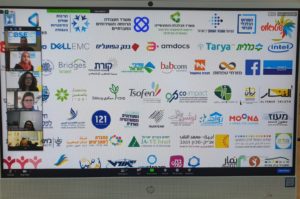The annual conference of the Socio-Economic Forum, attended by the President, was attended by senior officials in the Israeli economy, ministers, and representatives from leading companies. Kiram Baloum, CEO of Jasmine and leader of the national project Wesource for creating diverse procurement: “We have developed a solution that has the potential to be the magic bullet, both for small, medium-sized businesses and for companies and corporations, authorities and government – everybody benefits from diverse procurement.”
“Integrating diverse businesses as diverse and stable suppliers in the supply chains of companies and corporations is good business and it yields profit that is of both financial and social value,” said Kiram Baloum, CEO and founder of Jasmine, at the annual conference of the Socio-Economic Forum, held on December 28, 2020, in the presence of the President of the State, Mr. Reuven Rivlin.
Baloum, which was invited to participate in the “Diverse Supply Chains and Blue and White Procurement” session, is leading the diverse procurement revolution in Israel, through the Wesource project, which works to integrate business owners in Israel as suppliers in companies and corporations in the local economy.
The conference was attended by senior officials in the Israeli economy, ministers, opinion leaders, seniors from research bodies, businesses, and leading companies in the local economy. The session about procurement was facilitated by Yifat Zamir, VP of Strategy of the Socio-Economic Forum, and attended by Yael Mevorach, CEO of the Ministry of Social Equality, Moshe Riani, VP of Supply and Logistics at Strauss, Bar Avraham, Global Purchasing Manager and Diverse Purchasing At Intel Israel, Summer Blanc, CEO and owner of BSE and Hela Ofir, Business Manager for the Community Zionism 2000.
“We are all committed to promoting diverse procurement,” she added. “There is a place and a home for everyone at Wesource and together we must create and strengthen the demand for diverse suppliers, and purchase from them in order to strengthen the local economy – because an economy in which everyone participates is one that yields abundance, a sense of belonging, inclusion, profit, and stability”.
To date, thousands of potential business owners have been identified
Baloum was invited to speak at the significant, high-profile conference, after establishing the national dedicated project Wesource for diversified procurement, as part of which customized procurement methods for companies and corporations were promoted for the first time, including matching of diverse suppliers in all areas to various companies. In this context, the Jasmine Organization, in collaboration with Zionism 2000 and the Strauss Groups, presented the venture in the session, indicating that it was a 3-year venture, born as a national social enterprise, after the partners identified the need to develop business opportunities among small and medium-sized businesses and open up potential markets and doors to large acquisitions in companies and corporations, including developing business aptitude among those business owners as potential suppliers.
The venture is adapted to the local economy and was built after those who collaborated to establish it initiated a “round tables” meeting and an in-depth dialogue with business owners, CEOs, VPs, and Procurement Managers of leading companies. “It was crucial that we listen for the needs and requirements of both sides with the aim to formulate a diverse procurement platform that would occur as an economic business opportunity,” said Baloum, “We have worked with procurement managers in companies and corporations to build operational solutions, including adjustments and facilitations – all in order to generate demand for diverse suppliers.”

As part of the project, more than 2,000 businesses have been found throughout the country, of which about 700 businesses got work with Jasmine to develop business aptitude as diverse suppliers. Now, the organization’s goal is to reach 1,000 businesses that have the capacity to integrate into the diverse procurement initiative, of which at least 60 percent are to be integrated as suppliers in the corporate procurement by the end of 2021.
Jasmine also emphasizes that the benefits of promoting diverse procurement in the supply chain include reducing costs, increasing profitability, increasing innovation by introducing diversity and dynamism, addressing unique market needs and increasing the competitive advantage, developing new businesses, and strengthening the entire economy, to name a few.


